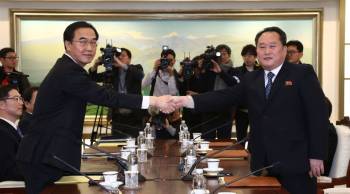North Korea: A fragile economy after Kim Jong-Il
Share Now on:
North Korea: A fragile economy after Kim Jong-Il
Kai Ryssdal: Bearing in mind that you have to take everything North Korean with a grain of salt, we asked Marketplace’s Bob Moon to start us off today with a little context.
Bob Moon: North Korea’s gross domestic product is estimated to be just a tiny sliver of the size of South Korea’s bustling $1 trillion economy — as little as 3 percent of that.
By one estimate, North Korea’s average official salary is equivalent to roughly $2 a month — although it’s thought that the thriving black market brings that up to around $15 a month.
The North Korean government makes money through illegal trading, too: It’s known to traffic in an international black market for weapons, illegal drugs and counterfeit currency. Seventy-five percent of the country’s trade is with China, and in return for providing the bulk of food and military aid to North Korea, the Chinese are allowed to exploit the country’s resources through mining and fishing.
North Korea has long relied on handouts to feed its own people. It’s received more $2 million in U.S. humanitarian aid this year — even as international sanctions have been tightened over its defiant development of nuclear weapons.
So with that as a setup, we turn to David Kang. He teaches international relations and business at the University of Southern California, where he’s also the director of the Korean Studies Institute. Welcome to the program.
David Kang: Delighted to be here.
Ryssdal: Given all that we just heard from Bob, is it too much for us to say North Korea even has an economy?
Kang: They certainly have an economy, it’s just functioning at a very low level. And there is an increasing amount of black market or gray market economy where people are selling their own produce in the streets, there’s people illegally going back and forth across the China-North Korea border and importing food, and other, even DVDs. So there’s definitely an economy, it’s just a very small economy.
Ryssdal: Which implies, of course, they have DVD players there, right?
Kang: Well, that’s the interesting thing, because there’s a lot of reports that over the last 10 years, North Korea has opened up substantially — not by any design, but simply because the central government has lost control over its provinces.
Ryssdal: We were obviously talking about this story at our morning meeting today and we were trying to figure out why in and of itself the North Korean economy matters. And the point we came to, and my question for you is: It doesn’t matter in and of itself — it’s the damage it does to everybody else on the way down: the South Koreans, the Chinese, and how it draws everybody in.
Kang: Yes, absolutely. The North Korean economy is so small right now — there is smuggling, there is some illicit activities — but it’s not significant at all. But if there’s any problems in North Korea — Japan, South Korea and China all have these vibrant, massive economies and they’re interconnected with the world and the United States. And all of these countries will be directly affected if there’s a collapse, chaos, etc.
Ryssdal: Tell me what that looks like.
Kang: Well, in the worst case, there’s a power struggle, there’s loose nuclear weapons running around, and Japan, South Korea and China are drawn into an extremely ugly, potentially very dangerous situation. And of course the U.S. would be involved as well. In a less apocalyptic manner, a general breakdown of the society just means potentially more refugees coming out the country, it means more concern about what the government might do in response, and the North Korean government sometimes takes very belligerent actions.
Ryssdal: What about the new guy, Kim Jong-Un, the third son? Does anything change?
Kang: Most likely, in the short run, it will be a status quo. Precisely because he was chosen by the senior leadership and his father, because I think they expected him to be the one most likely to continue the current policies.
Ryssdal: Is there a way that you see North Korea working its way toward any kind of real economic liberalization?
Kang: Well, about 10 years ago, the government made some baby steps toward opening up. In 2002, the government basically allowed supply and demand to set prices, although they continued to administer, by fiat, wages. And prices went through the roof — 1000 percent inflation on things. Since that time, the government has tried to pull back on these economic reforms, and they’ve had limited success because the black market is there, the government control is weaker.
Ryssdal: You know what I’ve been thinking about all day? You know that picture that’s been circulating, the space shot of Asian countries and they’re all lit up and you can tell that’s economically vibrant, and then you’ve got that black hole that is North Korea? I mean, it’s extraordinary.
Kang: Yeah. If you think about all the countries in the region and what they’ve done with their economies, that North Korea hasn’t come anywhere close to that. So it’s very sad. And all that we can hope for is that over time, maybe this new leader or maybe just changes will force themselves on North Korea, and it will open up.
Ryssdal: David Kang at USC. Thanks a lot for coming in.
Kang: My pleasure.
There’s a lot happening in the world. Through it all, Marketplace is here for you.
You rely on Marketplace to break down the world’s events and tell you how it affects you in a fact-based, approachable way. We rely on your financial support to keep making that possible.
Your donation today powers the independent journalism that you rely on. For just $5/month, you can help sustain Marketplace so we can keep reporting on the things that matter to you.


















